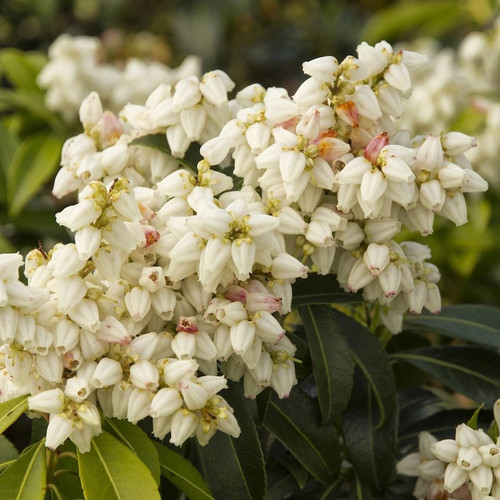
Pieris Shrubs
Zones 4-8
Partial Shade to Partial Sun
Attracts Pollinators
Disease/Pest Resistant
Why We Love Pieris
About Pieris Shrubs

Lily-of-the-Valley shrub, Andromeda
Native to East Asia, particularly Japan, Korea, and China, as well as parts of North America (e.g., the Appalachian Mountains).
Bushes
Evergreen
5 to 8
White, pink, or red (typically clusters of bell-shaped flowers)
Early spring (usually March to April, depending on location and variety)
Compact, upright, or mounding habit; can range from 3 to 12 feet in height, depending on the variety
Bees, butterflies, and birds (attracted to the flowers)
Shade (prefers partial to full shade), acidic soils
Deer-resistant, drought-tolerant once established
How To Use Pieris In The Garden
Pieris, an evergreen shrub, showcases year-round appeal with its broadleaf foliage. New growth emerges in striking shades of red, orange, and pink during both fall and spring, providing seasonal interest. In spring, it produces abundant flowers that serve as a charming backdrop for other spring bulbs. Its adaptability to various garden styles, from cottage gardens to Asian-inspired zen gardens, makes it a versatile choice for many landscapes.
The evergreen foliage of Pieris offers a consistent backdrop for smaller plants, enhancing the overall composition. When planted in containers, it acts as a focal point in seasonal mixed plantings, complementing rotating annuals or bulbs. Available in various sizes, Pieris can function in a foundation planting or larger shrub border, fitting seamlessly into diverse garden plans.
Pieris Care
Pieris thrives in partial sun, ideally with morning sunlight and afternoon shade. It prefers well-draining, acidic soil with a pH between 5.0 and 6.5. Regular mulching with pine straw or organic compost improves soil fertility and acidity. Newly planted Pieris requires consistent watering until established; thereafter, watering once a week suffices. Applying a slow-release fertilizer formulated for acid-loving plants in early spring supports healthy growth.
Pruning Pieris involves removing damaged branches in late winter or early spring and deadheading spent flowers to promote new growth. For winter care, ensure the soil continues to drain well to prevent root rot. For potted specimens, select pots large enough to accommodate the expanding root system, and water frequently to keep the soil moist, especially during warmer months. Potted specimens should be fertilized yearly to maintain health and appearance.
Learn More About Pieris Shrub Care

Pieris Companion Plants
Choose partners that like slightly acidic, humus‑rich soil that stays moist yet drains well and enjoy full sun in spring before settling into dappled summer shade beneath Pieris. Rhododendron fits easily into that niche, sharing the same pH needs and extending the early bloom season, while hydrangea picks up the display later with broad summer clusters that read crisply against Pieris’s finer foliage. Hellebore adds winter flowers beneath the shrub canopy, and hosta supplies low, architectural leaves that thrive in the cooler soil the evergreen framework provides.


























